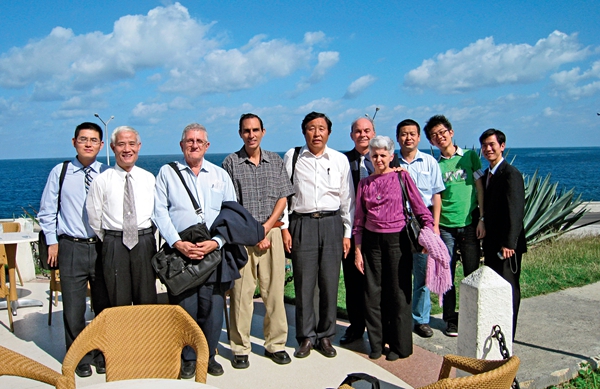International digital television standard developed in China
- By Zhang Hong
 0 Comment(s)
0 Comment(s) Print
Print E-mail China Today, July 17, 2017
E-mail China Today, July 17, 2017
|
Yang Zhixing (second from left) in a group photo with Cuban National TV Station workers in 2008, having gone to Cuba to do digital TV normative testing. [Photo/China Today] |
DTMB (Digital Terrestrial Multimedia Broadcast) has set a mandatory national standard for Chinese digital television. Yang Zhixing was the first to take charge of developing this standard. At the end of 2011, thanks to the efforts of Yang and his team, the DTMB system was officially nominated an international standard, alongside those of the United States, the EU, and Japan. The International Telecommunication Union (ITU) declared DTMB to be "a milestone in the 40 years of global digital television development, between 1972 and 2012."
Successful digital conversion
Murree is a small town located 1.5 hours' drive from Islamabad, capital of Pakistan. Here, in the heart of the mountains at an altitude of 2,200 meters, is a cooperation project between Chinese and local companies with the aim of realizing the DTMB standard.
"China has long held the world record for the production of color TVs and domestic television ownership. However, in the days of first black-and-white, and then color television that preceded the transition to digital technology, China adopted the European standard without having intellectual property rights over key technologies," explained Yang Zhixing. At that time, he was researching the development of satellite receiver demodulators, but he foresaw the potential of digital television. He understood that this technology would soon represent a major shift, allowing everyone to watch the small screen at high quality.
In 1999, the National Digital Television Leading Group was established in China with the aim of developing a domestic standard for digital television. In the same year, a research center specializing in digital tele-transmission techniques was established at Tsing-hua University. Yang Zhixing was in charge of this project.
"Digital has truly revolutionized the small screen. The quality is much better today than with analog TV," Yang said.
Superiority of Chinese standard
What are the strengths of the Chinese standard in comparison with the other three standards? In short, it is based on a stable system, has a high spectral efficiency, uses broadband and covers a wider area.
In addition, the Chinese standard adopts low-density parity check (LDPC), a new error-correction linear code. Invented by Robert Gallager, an American professor at the Massachusetts Institute of Technology (MIT) in the 1960s, the LDPC system ensured optimum error correction, but due to its technical complexity it was not until the 1990s that it was finally implemented. The group headed by Yang Zhixing was the first to integrate this LDPC system into a digital television standard. Nowadays, second-generation standards in Europe and the United States also use this LDPC system.
In August 2006, the Chinese standard was unveiled and became mandatory nationally. During the 2008 Beijing Olympic Games, this new standard was tested in the eight host cities of this competition, including Beijing, Shanghai and Zhuhai. It has since been extended to other Chinese cities and provinces, and with more investment could expand to nationwide coverage.
In 2006, Hong Kong announced its intention to adopt the European standard. Nevertheless, the following year, Yang Zhixing and his group visited Hong Kong, and their standard was trialed for six months. As the Chinese standard clearly surpassed that in force in Europe. Hong Kong then changed its mind and opted for the former. To date, 70 percent of Hong Kong viewers benefit.
Encouraged by this success in the Hong Kong market, between 2008 and 2009, Yang Zhixing repeatedly visited four Latin American countries, namely Cuba, Venezuela, Peru, and Ecuador. He made so many trips that he lost count. "Over two years, I have accumulated enough air miles on my Air China and Air France loyalty cards to qualify for a gold card, even though I flew economy class," joked Yang Zhixing.






